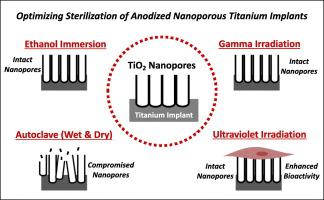Biomaterials Advances ( IF 5.5 ) Pub Date : 2021-09-15 , DOI: 10.1016/j.msec.2021.112429 Tianqi Guo 1 , Necla Asli Kocak Oztug 2 , Pingping Han 1 , Sašo Ivanovski 1 , Karan Gulati 1

|
Towards clinical translation of bioactive nano-engineered titanium implants, achieving appropriate sterilization and understanding its influence on the modified implant characteristics is essential. With limited studies exploring the influence of sterilization techniques on electrochemically anodized titanium with TiO2 nanostructures, we aimed to advance this domain by performing an in-depth evaluation of the influence of common sterilization techniques (ethanol immersion, various UV irradiation times, gamma irradiation, and dry/wet autoclaving) on TiO2 nanopores fabricated on micro-rough Ti surfaces (dual micro-nano) via single step anodization. Various sterilized surfaces were systematically compared in terms of topographical, chemical, crystalline, wettability and mechanical characteristics. Next, we investigated the protein adhesion capacity and functions of primary gingival fibroblasts (proliferation, adhesion/alignment and spreading morphology) to compare the bioactivity of the sterilized nanopores. Ethanol immersion, gamma irradiation and UV irradiation conserved the topography of the fabricated nanopores, while autoclave sterilization (both dry and wet) compromised the nanoporous structures. Various duration of UV-sterilization resulted in no significant changes in the surface topography and chemistry of the fabricated TNPs. Our findings revealed that UV irradiation is the most appropriate technique to sterilize nano-engineered titanium implants for appropriate wettability, protein adhesion capacity and enhanced metabolism and proliferation of human gingival fibroblasts (hGFs). This study systematically investigated the influence of sterilization on anodized nano-engineered titanium implants towards achieving reproducible outcomes (in terms of topography, chemistry and bioactivity), and found that UV irradiation holds great promise for application across different nano-engineered metal surfaces.
中文翻译:

灭菌对阳极氧化纳米多孔钛植入物性能的影响
对于生物活性纳米工程钛植入物的临床转化,实现适当的灭菌并了解其对改良植入物特性的影响至关重要。由于探索灭菌技术对具有 TiO 2纳米结构的电化学阳极氧化钛的影响的研究有限,我们旨在通过对常见灭菌技术(乙醇浸泡、各种紫外线照射时间、伽马照射、和干/湿高压灭菌)在 TiO 2 上通过一步阳极氧化在微粗糙 Ti 表面(双微纳米)上制造的纳米孔。在地形、化学、结晶、润湿性和机械特性方面对各种消毒表面进行了系统比较。接下来,我们研究了初级牙龈成纤维细胞的蛋白质粘附能力和功能(增殖、粘附/排列和扩散形态),以比较灭菌纳米孔的生物活性。乙醇浸泡、伽马辐照和紫外线辐照保留了所制造纳米孔的形貌,而高压灭菌(干式和湿式)会损害纳米孔结构。不同的紫外线消毒持续时间导致制造的 TNP 的表面形貌和化学性质没有显着变化。我们的研究结果表明,紫外线照射是对纳米工程钛植入物进行消毒的最合适技术,以获得适当的润湿性、蛋白质粘附能力以及增强人牙龈成纤维细胞 (hGF) 的代谢和增殖。这项研究系统地研究了消毒对阳极氧化纳米工程钛植入物的影响,以实现可重复的结果(在形貌、化学和生物活性方面),并发现紫外线照射在不同纳米工程金属表面的应用中具有广阔的前景。











































 京公网安备 11010802027423号
京公网安备 11010802027423号